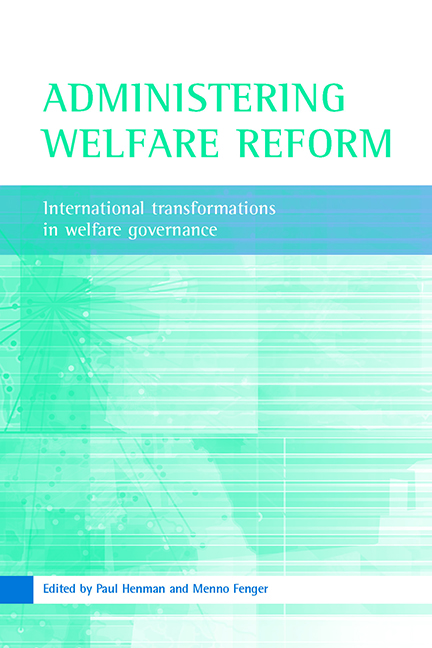Book contents
- Frontmatter
- Contents
- List of tables
- Preface
- Acknowledgements
- List of abbreviations
- Notes on contributors
- one Introduction: administering welfare reform
- two Welfare reform as governance reform: the prospects of a governmentality perspective
- Part One Participants: reforming the agents of welfare delivery
- Part Two Practices: the welfare governance of street-level practices
- Part Three Processes: the changing spaces of welfare governance
- Index
- Also available from The Policy Press
four - Shifts in welfare governance: the state, private and non-profit sectors in four European countries
Published online by Cambridge University Press: 14 January 2022
- Frontmatter
- Contents
- List of tables
- Preface
- Acknowledgements
- List of abbreviations
- Notes on contributors
- one Introduction: administering welfare reform
- two Welfare reform as governance reform: the prospects of a governmentality perspective
- Part One Participants: reforming the agents of welfare delivery
- Part Two Practices: the welfare governance of street-level practices
- Part Three Processes: the changing spaces of welfare governance
- Index
- Also available from The Policy Press
Summary
As we have seen in other chapters of this book, the administration and implementation of welfare involve a wide variety of state organisations, private commercial organisations and non-profit organisations. However, the roles and positions of these state, private and non-profit organisations in administering and implementing social policies vary significantly between countries. This variation is commonly attributed to the differences in welfare regimes (Esping-Andersen, 1990). However, in the era of welfare reform, everything is in flux. This includes the role and position of state, private and non-profit actors in social policies. The concept of governance, which is widely gaining popularity in social policies (see Newman, 2001; Daly, 2003; Ewalt and Jennings, 2004), refers to these changing relations between government and society (Daly, 2003, p 116). Governance is about ‘sustaining co-ordination and coherence among a wide variety of actors with different purposes and objectives such as political actors and institutions, corporate interests, civil society, and transnational organizations’ (Pierre, 2000, p 4). So there are many reasons to assume that welfare reform has affected the involvement of state, private and non-profit actors in administering and implementing social policy.
In this chapter, the key question is what shifts have taken place in the role and position of state, private and non-profit organisations in the administration and implementation of social policies since the early 1990s. To answer this question, I will focus on the role of the state, the private and the non-profit sectors in four European countries. More specifically, the attention is aimed at the delivery of unemployment benefits on the one hand and all activities that are focused on getting unemployed people back to the labour market (also known as ‘active labour market policies’) on the other hand. As these two streams become increasingly interconnected in modern Europe, I use the concept of employment policy to refer to both activities (Lødemel and Trickey, 2001). In the next section, I will present four general perspectives on the shifts between the roles of the state, the private and the non-profit sectors in welfare governance. The third section contains a brief review of the literature on the three societal domains – state, private and non-profit sector. The shifts between these domains are the key focus of this article. In section four, an overview will be given of the developments that the four examined European countries have gone through since the early 1990s.
- Type
- Chapter
- Information
- Administering Welfare ReformInternational Transformations in Welfare Governance, pp. 73 - 92Publisher: Bristol University PressPrint publication year: 2006



